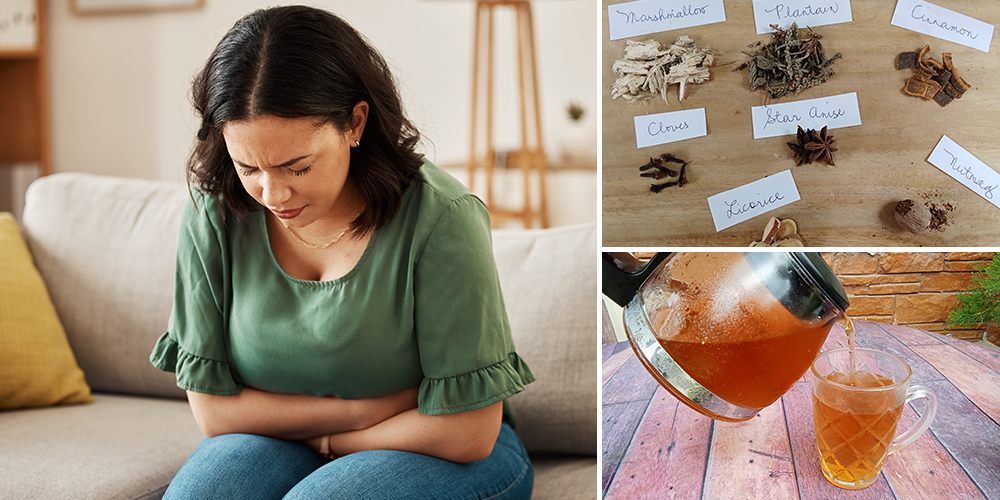
This is Why Your Gut Might Be in Trouble
Is it just fatigue or some skin problems, or is your gut already showing some red flags? This is why your gut might be in danger:
A gut problem manifests different signs and symptoms. Many of these mimic other health issues, so the treatment plan may be inappropriate.
What we are not aware of is that rectifying gut health can cumulatively affect the overall health of a person. But, how can we identify the subtle signs our gut might be telling us? What can go wrong if it goes untreated?
Signs That the Gut Is in Trouble
Occasionally, we experience digestive disturbances that are not worth worrying about. What is more pressing are the recurring digestive problems, which are apparent red flags of an unhealthy gut.
Here are some signs you need to be wary of:
Persistent Stomach Upset
If you constantly experience constipation, bloating, flatulence, side pain, diarrhea and heartburn, they can be signs of an unhealthy gut. Recurring tummy problems indicate that it has trouble breaking down food and results in pain, discomfort and changes in the bowel.
Extreme Exhaustion
Feeling inexplicably tired despite getting enough sleep may also point to a GI problem. If the gut cannot digest food, it limits nutrient absorption and may affect your energy level.
Bad Breath
Gut problems such as chronic constipation may cause toxin buildup. It results in bad breath that does not go away even with proper oral care. Stomach issues like GERD, reflux and ulcers may also result in halitosis.
⇒ Why You Should Sleep on Your Left Side (Video)
Food Intolerance
Food intolerance is an impairment caused by a lack of digestive enzymes or intolerance to a certain chemical in foods. Over time, a person may also develop food intolerances due to poor gut health and disruption of gut bacteria.
Food intolerances are different from food allergies as the latter show different reactions. A food intolerance only involves digestive symptoms such as bloating, abdominal pain and nausea.
Sugar Cravings
According to a published study, the gut microbiota may impact feeding behavior and suppress feeding induced by palatable foods. If you constantly eat healthy foods, the good gut bacteria multiply and increase the inclination to nutritious foods.
Eating junk foods and high sugar foods overthrows the gut microbiome. Bad gut bacteria thrive and increase the attraction to high sucrose and refined foods. The disruption of the gut microbiome will increase sugar cravings, worsening its imbalance.
Sleep Problems
According to Henry Ford Health, chronic sleep deprivation is due to a disbalance of cortisol. It can affect intestinal permeability and cause bloating, inflammation and food sensitivities. These conditions will only lead to the worsening of sleep problems.
Skin Irritations
Skin problems like acne, psoriasis and dermatitis may be signs of an imbalanced gut microbiome, especially if you haven’t experienced them before. The body has the gut-brain-skin axis, which correlates the overall health. If the gut microbiome is disrupted, it cannot maintain optimal health and may trigger inflammatory skin problems.
Unexplained Weight Loss or Gain
An imbalanced gut affects the way nutrients are processed, absorbed and stored, which leads to changes in body weight. Weight loss happens due to the decreased absorbability of nutrients. Meanwhile, overgrowth of bacteria and increased sugar cravings can lead to weight gain.
Autoimmune Problems
Some autoimmune disorders like thyroid problems, type 1 diabetes, rheumatoid arthritis and multiple sclerosis may be triggered by bad gut health. A bad gut creates an immune imbalance and affects the metabolism.
Did you know Nicole Apelian thrived for 57 days on the History Channel’s Alone despite having Multiple Sclerosis? Want to know her secret? Watch her share it in this video!
Habits That Destroy the Gut and How to Heal It
You may unknowingly destroy your gut not only with your diet choices but also from other factors. The good news is that most of these can be rectified by some lifestyle changes.
Poor Diet Choices
What you eat affects the way your body craves food. If you want to improve your gut health, cut back on processed, refined and sugary foods. Increase your intake of fruits and vegetables, high-fiber, and prebiotic and probiotic-rich foods.
Not Drinking Enough Water
Not drinking plenty of water decreases the production of saliva and gastric juices. It also affects the movement and absorbability of food and nutrients. Drink water during and after the meal and get plenty of it throughout the day to improve the digestive process and prevent constipation.
Inactive Lifestyle
An inactive lifestyle also makes the gut muscles inactive making them lose their coordination over time. Keep regular physical activity and exercise to improve gut motility, tone the digestive muscles and promote a healthier gut.
Not Getting Enough Sleep
Getting enough sleep will balance the gut microbiome and decrease the stress level. Always aim for at least 7 to 8 hours of sleep to support your gut health.
I have nights when I just can’t fall asleep. And I have nights when I can’t rest enough because I keep waking up. Melatonin is good, however, it’s so hard to mimic what your brain produces without causing side effects or addiction. A tincture based on Valerian, also called Nature’s Valium is what soothes me at night and helps me fall asleep fast and rest enough to be sharper than people my age. If you don’t want to make it yourself, you can get it from here!
Bad Eating Habits
Eating fast, stress eating and eating too close to bedtime are bad habits for the gut. Large food volumes than the digestive system can process may cause heartburn, bloating and indigestion. Schedule your meal 2 to 3 hours before bedtime to give your digestive system ample time to work. You may also take digestive and sleep-enhancing tea.
Smoking and Drinking
Smoking and alcohol deplete the anti-inflammatory properties of the gut bacteria, which may eventually result in gastric cancer. You can mitigate this risk by observing a healthy lifestyle and quitting bad habits.
Not Managing Stress
Stress that goes unmanaged and untreated can cause you more health troubles in all aspects of life. Find ways to reduce life stressors and avoid them, if possible, for better metabolic homeostasis.
⇒ Anxiety & Stress Tincture (Going Fast! Secure Yours)
How Gut Health Influences Overall Health and Wellbeing
A healthy gut means having good digestion and regular bowels. If your gut is at its optimal health, it can also positively impact your overall health.
The gut-brain axis, or interconnection of the digestive and nervous systems, affects different organs in the body. The cross-talk between these organs influences and improves body functions like:
 Gut motility or movement
Gut motility or movement- Mood
- Metabolism
- Immune response
- Cognitive function
- Pain sensitivity
- Stress level
Good health starts in the gut. Make sure to keep it in check, watch for the red flags and work to correct and heal gut problems before they create bigger health concerns.
Gut Supportive and Healing Tea
One of the best ways of healing and supporting gut function is taking gut-supportive tea.
Here is a recipe from powerful herbs with proven healing properties for the digestive system. Always consult with your doctor as some herbal ingredients may interact with health conditions and prescribed medications.
- Marshmallow Root (Althaea officinalis). A mucilaginous demulcent herb with a mucus-like consistency that coats the digestive tract and soothes inflammation.
- Dried Plantain (Plantago major). Also a mucilaginous and astringent herb with stool bulking and softening effect. Plantain can treat stomach inflammation and bowel issues.
- Cinnamon (Cinnamomum cassia). Cinnamon is a spice with prebiotic properties that may help restore the balance of gut bacteria.
- Clove (Syzygium aromaticum). Reduces intestinal gas, and heals peptic ulcer and gastric irritability. It can also control sugar cravings and treat bad breath. Both cinnamon and clove can thin blood, so be careful with the dosage especially if you already take some blood-thinning medication.
- Star anise (Illicium verum). It is used to dispel gas, treat cramps and indigestion, and kill intestinal parasites.
- Licorice (Glycyrrhiza glabra). For getting rid of toxins, reducing stress, and regulating hormones. It can also treat stomach problems like colitis, gastritis, peptic ulcer, etc.
- Nutmeg (Myristica fragrans). Mainly used to improve the aroma of the tea. Nutmeg is also a good spice for stimulating digestion and improving appetite.
Gut Healing Tea Recipe
 Ingredients
Ingredients
- 2 tsp marshmallow root
- 2 tsp dried plantain
- 1 tsp cinnamon chips or 2 sticks
- 6 cloves
- 2 pods star anise
- 1 tsp licorice root
- Pinch of freshly grated nutmeg
Steps
- Combine all the herbs and spices in a quart-size tea infuser, French press or jar.

- Pour about 3 to 4 cups of hot water.

- Let it steep overnight or all day. You may put it in the fridge to steep if you like.

- Strain the tea into a cup.

To use: You can reheat the tea if you want or enjoy it cold from the fridge. You could keep a larger batch in the fridge for three days to make sure it’s safe. Drink out as much liquid as you can throughout the day. The tea is generally safe to consume for a long time, but it is still recommended to take it moderately and limit the period of intake.

 Gut motility or movement
Gut motility or movement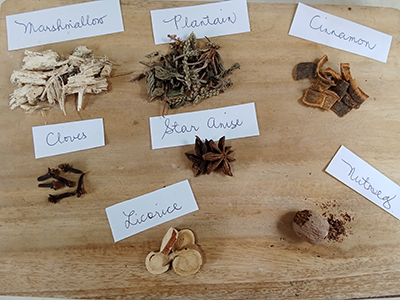 Ingredients
Ingredients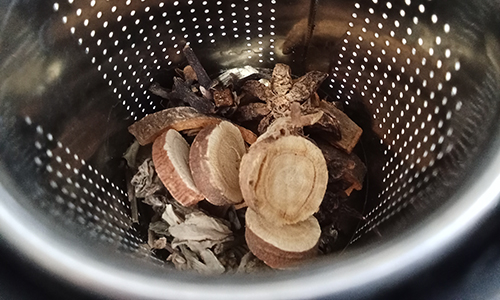
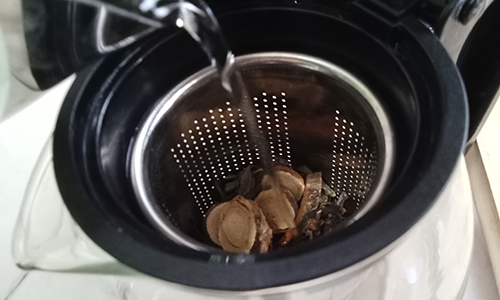
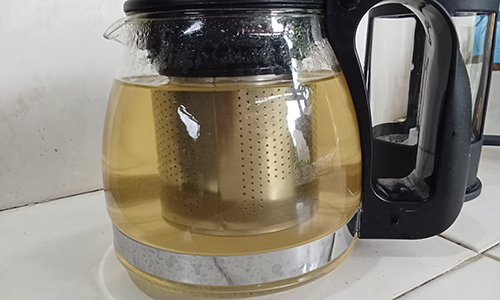
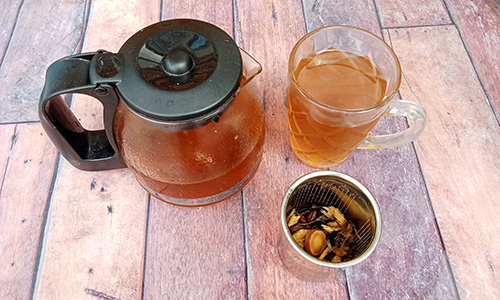
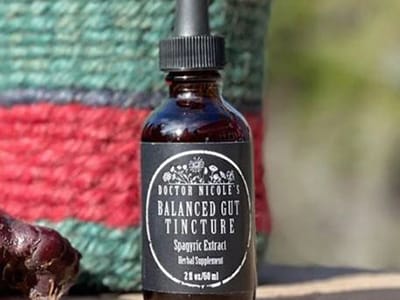
I hear that cassia cinnamon is harmful to the liver, instead Cylon Cinnamon (Cinnamomum verum) is highly recommended and it’s much more beneficial, but do your own research